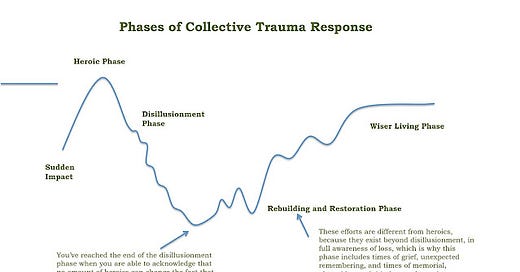Remembering
On 23rd October 1642 the battle of Edgehill was fought between the royalists and the parliamentarians with a huge loss of life on both sides. But many more people died in the months and years that followed as the war, and the other conflicts in the ‘Wars of the Three Kingdoms’, took a terrible toll on the country. Around 4% of the total population dying from war-related causes (compared to about 2.2% in World War I). Even after these wars were over, the people of this country suffered many years of hardship.
On 8th November this year, we will again be remembering those that lost their lives in the wars of this country. We’ll also be remembering those that returned, scarred by their experiences, those that made huge sacrifices at home, those that served in so many ways to sustain life at home, working to provide food and care; nursing the wounded, comforting the grieving, and somehow keeping life going.
After each of these wars, there is the long process of trying to return to ‘normal’, carrying the financial burdens of those conflicts as well as the physical and emotional scars.
That’s why it’s so important that we remember them: to honour those that paid such a high price (not only those that died, but also those that lived through it and had to rebuild afterwards), to remind ourselves of the cost of war and to recommit ourselves to work for peace.
This year I think it’s also important to remember that these times of great trial and tragedy all did come to an end. I am sure at the time that many people wondered if they ever would; if the war would be won or lost, if they would ever be able to return to life without fear of an air raid, or a gas attack, or the terrible news of a relative that had been killed. But they all did come to an end.
The Institute for Collective Trauma and Growth (ICGT) has a chart that helps us understand the phases of emotional response that communities go through in dealing with loss. And whilst what we are facing today is very different from the wars that were faced by our ancestors, I think the chart provides a good tool to help us reflect on where we are individually and collectively in the battle we are facing against the coronavirus.

Heroic Phase
This phase tends to involve a lot of activity related to what has happened; getting people out of harm’s way, supporting those affected, etc. In our communities this showed itself wonderful ways in which people stepped up in the early days of the outbreak. Across the area there was a great community response and the sense of ‘we are in this together and we will get through this together’.
Disillusionment Phase
This phase tends to be marked by a pervasive feeling of exhaustion. As people experience adrenaline waning, they often describe feeling achy and lethargic.
ICGT find that communities know they’ve reached the end of the disillusionment phase when most people in their group honestly feel a sense of two truths: they can acknowledge the loss that has occurred, and they sense there still is good in the world. Coming to that point takes time
Rebuilding and Restoration Phase
This phase involves activity again, but this time it tends to be collaborative, patient, steady, and focused on the best interests of the range of people who have been impacted by what has happened.
Wiser Living Phase
This phase has many names, including "new normal." It generally refers to an acknowledgment that what has occurred has changed the community in a lasting way. Though healing can happen, there may be scars.
We will all be at different stages in our emotional response to the ‘trauma’ that we are going through due to Coronavirus. And it’s important to note that this is not an ‘event’ that we are recovering from, it’s something we are still living through, and are likely to be for at least the next year.
When St Paul wrote to a community in Colossae that was facing great persecution and hardship he said, ‘clothe yourselves with compassion, kindness, humility, gentleness, and patience. Bear with one another and, if anyone has a complaint against another, forgive each other… Above all, clothe yourselves with love, which binds everything together in perfect harmony. ’
So, we need to continue to be patient with and support one another through this. We need to remember that we are in this together and will get through this together. That’s why I am so pleased to see the COVID-secure events that are being orgainsed by many in our villages. Providing ways of coming together face-to-face or online. Ways that we can see each other, share hopes and fears, laugh together and have some fun.
My prayer for us all, is that we continue to find ways to make positive memories in these times, things that keep us together and will help us to keep hoping and believing in a time when this current battle will come to an end.
Rev Barry Jackson



